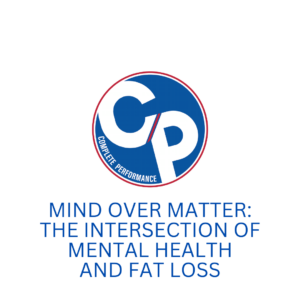In the pursuit of physical health and fitness, we often overlook the crucial role that mental health plays in achieving our goals. The connection between our minds and bodies is incredible, influencing everything from our eating habits to our motivation for exercise. In this blog, we’ll explore how mental health impacts fat loss and share strategies to cultivate a positive mindset for a healthier lifestyle.
The Mind-Body Connection:
Our emotions, thoughts, and behaviors are intertwined with our physical well-being. Stress, anxiety, depression, and other mental health challenges can affect our eating patterns, metabolism, and overall motivation for exercise. Understanding this connection is key to addressing both mental and physical health concerns simultaneously. Here are some key aspects of the Mind-Body Connection:
Emotional Eating:
Emotions can significantly impact our eating habits. Stress, anxiety, boredom, and sadness can lead to emotional eating, where we turn to food for comfort or distraction. This often results in consuming high-calorie, unhealthy foods that can contribute to weight gain. Recognizing emotional triggers and finding alternative coping strategies such as mindfulness, journaling, or talking to a friend can help break the cycle of emotional eating.
Stress & Cortisol:
Chronic stress triggers the release of cortisol, a hormone that can increase appetite and promote fat storage, especially around the abdominal area. Elevated cortisol levels can also lead to cravings for sugary and fatty foods. Managing stress through relaxation techniques like deep breathing, meditation, or yoga can lower cortisol levels and support fat loss efforts.
Mindset & Motivation:
Our mindset plays a crucial role in our ability to stick to a fat loss plan. A positive mindset focused on progress, self-compassion, and realistic goal-setting can enhance motivation and resilience. On the other hand, negative self-talk, perfectionism, and unrealistic expectations can lead to discouragement and hinder progress. Cultivating a growth mindset that embraces challenges and setbacks as opportunities for learning and growth can boost long-term success.
Mindful Eating:
Mindful eating involves paying attention to hunger cues, eating slowly, and savoring each bite. This practice promotes greater awareness of portion sizes, food choices, and satiety signals, which can prevent overeating and support healthy weight management. Mindful eating also encourages a deeper connection with food, leading to more balanced and satisfying meals.
Sleep & Hormonal Balance:
Quality sleep is essential for hormonal balance and metabolism regulation. Lack of sleep disrupts hormone levels, including leptin and ghrelin, which regulate appetite and hunger signals. Sleep deprivation can increase cravings for unhealthy foods, impair decision-making related to food choices, and decrease energy levels for physical activity. Prioritizing adequate sleep hygiene, such as maintaining a consistent sleep schedule and creating a relaxing bedtime routine, can support fat loss and overall well-being.
Exercise & Mental Health:
Physical activity not only burns calories but also has profound effects on mental health. Exercise releases endorphins, neurotransmitters that promote feelings of happiness and reduce stress and anxiety. Regular exercise can improve mood, boost self-esteem, and increase motivation for healthy behaviors, including mindful eating and consistent physical activity. Finding enjoyable forms of exercise that fit your preferences and schedule can make staying active a sustainable habit for fat loss and overall health.
The mind-body connection for fat loss involves understanding and addressing emotional eating patterns, managing stress levels, fostering a positive mindset, practicing mindful eating habits, prioritizing quality sleep, and incorporating regular physical activity. By nurturing this connection, individuals can create a balanced and sustainable approach to fat loss that promotes overall well-being.
Stress and Emotional Eating:
One of the most common ways mental health impacts fat loss is through stress-induced emotional eating. When we’re stressed, our bodies release cortisol, a hormone that can lead to increased appetite and cravings for comfort foods high in sugar and fat. This can sabotage our weight loss efforts and contribute to unhealthy eating habits.
To combat stress eating, it’s essential to develop healthy coping mechanisms such as mindfulness, meditation, deep breathing exercises, or engaging in hobbies that bring joy and relaxation. These activities can help reduce stress levels and prevent emotional eating triggers.
Do you struggle with cravings caused by stress? Do they lead to emotional eating?
CLICK HERE for a copy of the Cravings Cheat Sheet to help bust your WORST cravings!
Mindset Shifts for Success:
Changing our mindset is a powerful tool for achieving fat loss and overall well-being. Instead of focusing solely on the number on the scale, shift your mindset to celebrate non-scale victories such as increased energy, improved mood, better sleep quality, and enhanced self-confidence. This positive outlook can fuel motivation and sustain long-term lifestyle changes.
Additionally, practice self-compassion and kindness toward yourself throughout your fat loss journey. Avoid negative self-talk or unrealistic expectations, and instead, embrace progress over perfection. Set achievable goals, track your progress, and celebrate every step toward a healthier you.
The Role of Exercise and Mental Health:
Regular physical activity not only contributes to fat loss but also has numerous mental health benefits. Exercise releases endorphins, the body’s natural mood-boosting chemicals, which can alleviate symptoms of anxiety and depression. Incorporating a mix of cardiovascular, strength training, and flexibility exercises into your routine can improve overall well-being and support fat loss efforts.
Moreover, find activities you enjoy to make exercise a fun and sustainable part of your lifestyle. Whether it’s dancing, hiking, yoga, or group fitness classes, discovering what brings you joy can make staying active feel like a rewarding experience rather than a chore.
Seeking Support:
Lastly, don’t hesitate to seek professional support if you’re struggling with mental health challenges or need guidance on your fat loss journey. A qualified therapist, nutritionist, or personal trainer can provide personalized strategies, accountability, and encouragement to help you reach your goals and maintain a balanced, healthy lifestyle.
By prioritizing mental health alongside fat loss, we can create a holistic approach to well-being that nurtures both our minds and bodies. Cultivating a positive mindset, managing stress, staying active, and seeking support are key ingredients for long-term success. Remember, a healthy lifestyle is not just about how you look but how you feel, think, and thrive in every aspect of life.
Looking for a fun, supportive community to boost your mood and support your mental health?
CLICK HERE to grab a Free Trial Week during May’s Mental Health Awareness Month.




